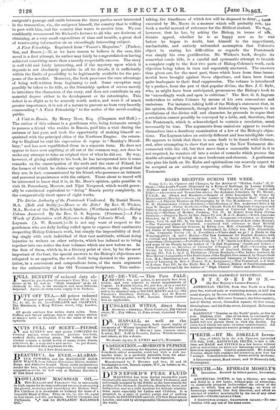Rector of the High School,' Quebec. (Wertheim and Co.)—Bishop Colenso
Answered. By the Rev. G. S. Ingram. (Freeman.)—A Few Words of Exhortation with Reference to Bishop Colenso's Work. By a Layman. (A. W. Bennett.)—It is not any want of respect to the gentlemen who are daily feeling called upon to express their sentiments respecting Bishop Colenso's work, but simply the impossibility of deal- ing singly with each individual of that vast multitude, without doing injustice to writers on other subjects, which has induced us to bring together into one notice the four volumes which are now before us. In the first of them, which is, in a literary point of view, by far the most important of the four, the special answers to the Bishop's objections are relegated to an appendix, the work itself being devoted to the presen- tation, in a convenient and compendious form, of the main argument for the authenticity of the Old Testament Scriptures. This under- taking, the timeliness of which few will be disposed to deny, s been executed by Mr. Moore in a manner which will probably ren,„ his book a useful manual of reference for the Biblical student. We Net, however, that ho has, by asking the Bishop, in terms of afk tionate appeal, whether he is as happy now as he was before he began to doubt, lent himself to the impertinent, uncharitable, and entirely unfounded assumption that Colenso's object in stating his difficulties as regards the Pentateuch was simply his own gratification. Mr. Wickes's book, despite its somewhat comic title, is a careful and systematic attempt to furnish a complete reply to the first two parts of Bishop Colenso's work, each objection being taken in turn and separately answered. The answers thus given are, for the most part, those which have from time imme- morial been brought against these objections, and have been found quite inadequate to their final suppression. The volume is introduced by a preface, from the pen of that popular divine, the Rev. J. C. Ryle, who, as might have been anticipated, pronounces the Bishop's book to be "exceedingly weak and open to criticism." The Rev. G. S. Ingrain undertakes to refute Colenso by means of his own concessions and omissions. For instance, taking hold of the Bishop's statement that, in his opinion, the Pentateuch, though not historically true, imparts to us revelations of the divine will and character, he proceeds to argue that a revelation cannot possibly be conveyed by a fable, and, therefore, that the Pentateuch, which is acknowledged to contain a revelation, must necessarily be true. The arguments from omissions appear to resolve themselves into a desultory examination of a few of the Bishop's objec- tions. The Layman takes an entirely different and less intelligible view. He appears to think that there is some fault to be found with Colenso, and, after attempting to show that not only is the New Testament dis- connected with the old, but that more than a reasonable belief in it is not required, he wanders off into a series of remarks which possess the double advantage of being at once irrelevant and obscene. A gentleman who pins his faith on Dr. Kahn and spiritualism can scarcely expect to be accepted as an authority respecting either the New or the Old Testament.






























 Previous page
Previous page